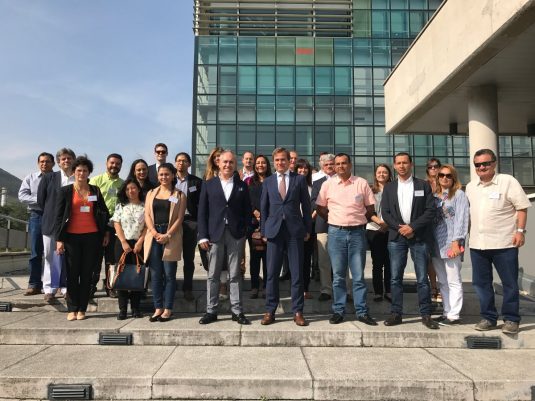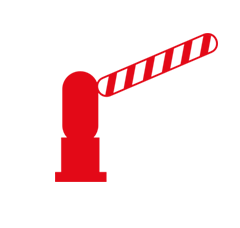On the eve of Mercabilbao and the Port of Bilbao’s joint participation in the Fruit Attraction Fair (18-20 October at IFEMA), the event bringing together the largest representation of the international fruit and vegetables production, the two entities have held several working sessions with some thirty managers from South and Central American companies, who have later travelled to Madrid to take part in the Fair.
With the collaboration and support of the Basque Government Overseas Action department, this has served to highlight the bid made by Mercabilbao and the Port to become the entry gate for goods coming from South and Central America, and their capacity to reship fruit and vegetables towards Europe and the rest of the Iberian Peninsula – an alternative to transporting horticultural produce by road.
During their stay, the entrepreneurs visited the Port of Bilbao’s container terminal, the Border Inspection Post and the perishable goods warehouse (Frioport), and were given information about its fruit-importing services. In addition, a seminar on the advantages of the operation was held, at which emphasis was placed on border sanitary controls and telematics solutions. Besides personnel from the Port Authority, representatives of the Phytosanitary, Overseas Health and Inspection (SOIVRE) Services also participated.
Previously, the group visited the Mercabilbao facilities in order to find out about the quality of its products and the good practices of the wholesalers who put them on the market. They also visited the Food Unit, where they saw a presentation of the joint internationalisation strategy of the two entities and the services they offer as references for importing and exporting horticultural produce.
Mercabilbao and the Port of Bilbao at Fruit Attraction
For the third year running Mercabilbao and the Port of Bilbao have travelled to Madrid together to take part in the Fruit Attraction Fair with a view to highlighting their internationalisation strategy, a bid to strengthen their position as an importing and exporting horticultural produce hub in the north of Spain. They have done so for some years by means of an alliance between the two entities and through an internationalisation strategy that enables them to increase entry and exit flows by taking advantage of existing synergies to attract new shippers and new shipping lines.
This is an ambitious bid which allows Bilbao people to connect with European markets like the Bordeaux Central Market, which they collaborate with closely in order to develop joint activities within the Basque Country-Aquitaine Euro-Region. Moreover, the Bilbao and Bordeaux Town Councils recently established the bases for a collaboration agreement to bring their citizens even closer in fields such as economic development, city planning and talent attraction and retention.
Mercabilbao’s strategic location – that is, very near to the intersection of the Paris-Hendaye-Madrid axis close to the Cantabrian Motorway and with a direct link to the motorway network – together with the Port of Bilbao, make it the

ideal point to carry out an efficient and quality internationalisation strategy. It is a competitive advantage for horticulture sector operators from the perspectives of economy, time, available infrastructures and existing logistics warehouses. In 2016, some 217,600 tonnes of fruit and vegetables were handled at the Mercabilbao facilities.
The Port of Bilbao boasts the most important container terminal in the north of Spain, and also the deepest. It offers a great number of maritime services that link it to over 900 ports worldwide. In 2016, its facilities handled 200,000 tonnes of fruit and vegetables. The greatest part of this traffic – about 77% – corresponded to exports.
Recently, improvements have been made in the Port infrastructures which benefit fresh products. On the one hand, the company operating the container terminal, Noatum Container Terminal Bilbao, and the Port Authority have defined an automatic access process at the new container terminal gates, which was launched in September, and which speeds up and simplifies the whole operational process, including that for fresh products hauliers. On the other, the number of plugs for reefers has been increased to 540 at present.
In addition, Noatum is extending its rail terminal and for mid-2018, it will be able to operate 550-metre trains. This will directly affect the rail connections in the Port, which at present has 110 trains entering and leaving weekly, which in 2016 transported 21% of container and 19% of general cargo respectively.
Likewise, Progeco Bilbao, a company installed inside the Port, is an authorised dealer for the most important brands of refrigerated container spare parts and offers a 24/7 repair service for reefer units. This company already has 12 docks – some 1,500 square metres – dedicated to cross-docking perishable goods at controlled temperatures from refrigerated lorries to containers. It also has a specialised workshop for repairing refrigerated equipment measuring some 400 square metres.

 Port access
Port access